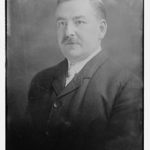American journalist Harry F. Guest of the New York Globe spent January and February 1920 reporting from revolutionary Ireland. Upon his return to America, he wrote two dozen stories based on his interviews and observations, which were syndicated to U.S. and Canadian newspapers through May 1920. See earlier posts in this series and other stories about American reporting of Irish independence at the linked project landing page. Reader input is welcomed, including photos or links to relevant source material. For this post only, I’ve linked the headline to a .pdf copy of the story for newspaper historians. MH
***
British Suspension of Irish Newspapers Raised Great Storm of Protest1
Guest, a veteran New York City reporter and editor, devoted this story to the antagonism between foreign and domestic newspapers and the British administration in Ireland at Dublin Castle. He wrote:
Being a newspaper editor in Ireland is a ticklish job. If you publish something which offends Dublin Castle, the police or military raids your offices and carry away vital parts of the presses. If you criticize Sinn Féin too severely, your office is likely to be stormed and the presses smashed.
As a newspaper man, I have great respect for the Irish newspapers. When one which has been suppressed receives permission to resume publication, it is the custom to come out in the next issue with a blast against the government which makes the previous ‘libel’ read like a hymn of praise.
Guest again referenced the Defense of the Realm Act, or “Dora,” which he noted was used to exert “strict censorship not only over dispatches sent from Ireland, but foreign news sent to Ireland as well.” This may be why Guest waited until he returned to America before writing his series about Ireland, just as United Press correspondent Ralph F. Couch had done in early 1919 after his scoop interview with prison escapee Éamon de Valera.
Guest reported the mid-January 1920, Dublin post office seizures of the New York American, Irish World, and Gaelic American,2 with “thousands of copies … carried off to Dublin Castle” because they contained articles about the Irish bond drive in America. “This was not the first seizure of its kind in Ireland and it probably will not be the last,” he wrote.
It should be remembered that Britain was not the first or only democracy to censor or suppress the press. In America, the Committee of Public Information (CPI), created in April 1917 by President Woodrow Wilson, “became the U.S. ministry for propaganda,” and an “unofficial censor” of the domestic and foreign press. Journalist George Creel and the secretaries of State, Navy, and War ran the CPI, which worked with the U.S. Postal Service to block distribution of the New York-based Gaelic American, Irish World, and Freeman’s Journal (Not the same-name paper in Dublin).3
Historian Ian Kenneally has explained the main political motivation for press censorship in Ireland was to keep the views and activities of the separatist Sinn Féin from Irish newspaper readers. He continued:
The situation worsened in September 1919 when the authorities in Dublin Castle abolished the post of censor. The decision was greeted by cynicism from the Irish press with newspaper editors deriding the fact that the censor may have gone but the restrictive regulations remained in place. A wave of newspaper suppressions swept the country. This was because the Irish press now had no censor to guide them as to what would be deemed unacceptable by Dublin Castle.4

Dublin Castle, the seat of the British administration in Ireland. Late 19th or early 20th century image. National Library of Ireland image.
By the time Guest arrived in Ireland in early 1920, more than two dozen Irish newspapers had been suppressed or had their foreign circulation banned for “a few days [or] longer periods,” he reported. The digital Irish Newspaper Archives contains 50 titles that published during 1920. An estimated 332 newspapers circulated in Ireland during the period 1900 to 1922, excluding British or American titles.5
Guest listed these papers as being suppressed:
Mayo News * Clare Champion * Newcastle-West Weekly Observer * Kings County Independent * Belfast Evening Telegraph * Dublin Evening Herald * Meath Chronicle * Galway Express * Ballina Herald * Killkenny People * Irish Republic * Southern Star (County Cork)
Most of Guest’s story detailed the December 1919 suppression of the Freeman’s Journal, which extended into January 1920. The action “aroused a storm of protest against the methods of Dublin Castle, in which even the press of England joined … The circumstances attending the suppression of the newspaper and the subsequent negotiations over its resumption of publication constitute a chapter of English history in Ireland that reflects little credit on the present administration.”
As mentioned at the top, Guest’s full story can seen by clicking the linked headline. The Freeman’s Jan. 28, 1920, editorial cartoon about the suppression, referenced by Guest, can be viewed here via the National Library of Ireland’s (NLI) Shemus Cartoon Collection. More on the history of the Freeman’s Journal is available in this October 2019 guest post by Irish historian Felix Larkin, who also wrote the linked NLI collection description.
NEXT: English Interests Hamper Industrial Development in Ireland, U.S. Writer Finds























